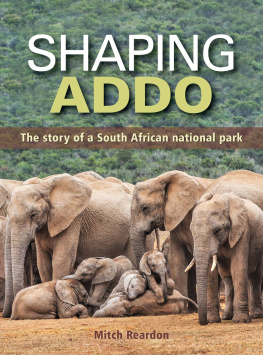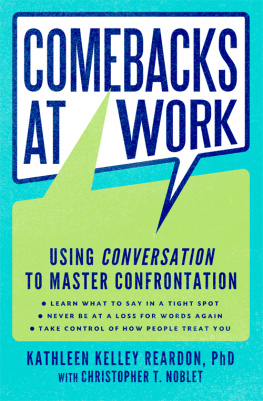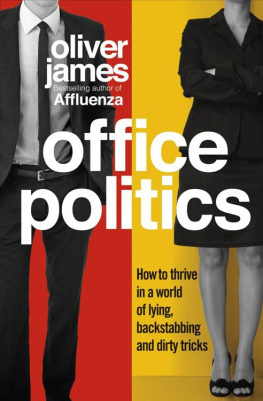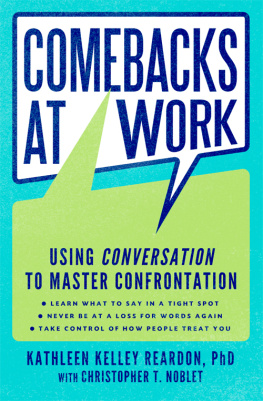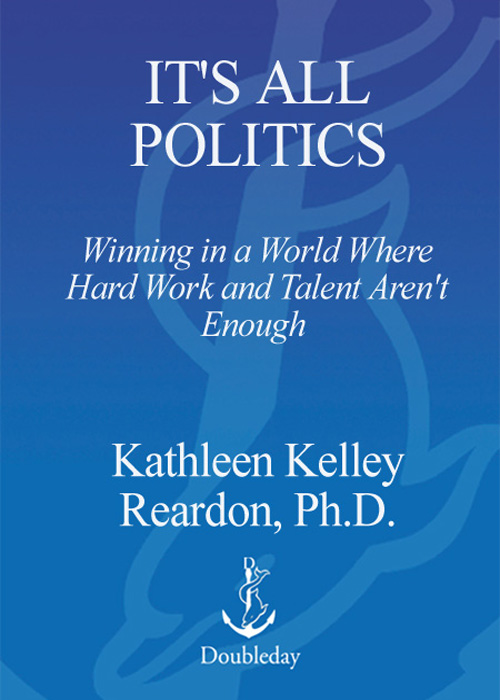
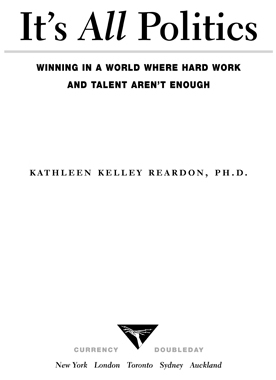
TABLE OF CONTENTS
To Chris
ACKNOWLEDGMENTS
First, my appreciation goes to Roger Scholl, editorial director at Currency Doubleday, and to my agent, Peter Ginsberg, who together made this book possible. As with my previous book on politics, The Secret Handshake, working with Roger and Peter has been a positive experience every inch of the way.
My appreciation goes also to my husband, Chris Noblet. He was researcher and editor on all aspects of this book and will no doubt read this acknowledgment and ask me to remove it. He is behind the scenes but front and center in deserved credit. This has been the case for many of my books, but even more for this one. When I was diagnosed with Parkinson's disease recently, I wondered whether writing was in my future. There were days of complete blur, especially while various medicines were being tried. The computer seemed a monster when once it had been a friend. Chris was there for me personally as he was professionally. He told me when something I wrote was just not good enough, even if this was among the last things I wanted to hear. He worked tirelessly on helping me express what some days would not come, and radiated pleasure and encouragement on the days when the fog cleared and my words rushed onto the page. This book is dedicated to Chris, as is my abiding love.
Sarah Rainone at Currency Doubleday edited this book with impressive commitment. She is a true reader's advocate in her quest for clarity, even while endeavoring to preserve the author's style and voice. She is a rising star and I was glad to benefit en route. I am also grateful to Sean Mills, Nora Reichard, Lawrence Krauser, Michael Collica, Luisa Francavilla, Umi Kenyon, and Laine Kavanaugh at Doubleday, and to Debby Manette for her skilled copyediting.
My appreciation goes to the hundreds of people who've told me their political stories. Some are named in this book, others given fictional names at their request.
I want to thank my children, Shannon, Ryan, and Devin. Devin makes me laugh when I least expect it. I treasure those laughs and the times when the dishes were miraculously done or a room was suddenly clean. Ryan is considerate and inquisitive. We often just sit and talk at length about a subject that has captured his interest. As he says, we share a very special bond. Shannon's enthusiasm for life and her spontaneous hugs brighten my days. Among her many interests, she wants to become a writer someday. This book is written with the fond hope that it will help them manage the politics in their own lives. My thanks also to all the members of my family, both immediate and extended, who continue to encourage me to write.
My friends always participate in what I write whether they share their experiences or encourage me in other ways. Thanks also to my colleagues at the University of Southern California, the Irish Management Institute, and University College, Cork, who have shared their knowledge of politics. While on leave from USC in Schull, Ireland, I was also blessed with the friendship of artists in the community, including Ann Stalberger, whose watercolors are superb, and who has been my encouragement and my mentor. To Peter Samuelson, Claudia Kennedy, and Debbie Sams of Washington, D.C.based First Star devoted to the protection and advancement of children's rights, I hope this will be a banner year when political walls of injustice and indifference crumble and children who live in harm's way will be better served.
CHAPTER ONE
IT'S ALL POLITICS
L IKE BUSINESS IN general, politics is not a spectator sport. You cannot afford to be apolitical at work if you have any aspirations for advancement. The only way to avoid politics is to avoid peopleby finding an out-of-the-way corner where you can do your job. Of course, it's the same job you'll likely be doing for the rest of your career if you remain politically impaired.
In any job, when you reach a certain level of technical competence, politics is what makes all the difference with regard to success. At that point, it is indeed all politics. Everyday brilliant people take a backseat to politically adept colleagues by failing to win crucial support for their ideas.
Sometimes politics involves going around or bending rules, but more typically it's about positioning your ideas in a favorable light and knowing what to say, and how, when, and to whom to say it. Refusing to participate in what you may consider the incivility of politics is exactly what will keep you a political underdog, watching helplessly as your career aspirations evaporate.
Ask yourself these questions to see if you're up to snuff on politics 101.
Can you effectively influence and manage people's perceptions of you and your ideas?
Are you able to convert enemies to allies?
Can you manage outcomes long before they're in sight?
Do your ideas get a fair hearing?
Do you know when and how to present them?
Are you in the loop?
If you've answered no to even one of these questions, you can learn a great deal from this book. Such political skills determine career success, but they are only the beginning. Politics is a highly complex skill set. Albert Einstein was once asked: Dr. Einstein, why is it that when the mind of man has stretched so far as to discover the structure of the atom we have been unable to devise the political means to keep the atom from destroying us? The great scientist replied: That is simple, my friend. It is because politics is more difficult than physics.
Politics is more difficult than physics because most of us have not devoted adequate time to the study of it. Most business schools disregard politics completely, even though the success of their students will depend to a large extent on their political skill level. This is the case for the elite scientist as well as the machinist working on a shop floor. Business schools generally ignore an entire type of human intelligence in favor of more technical subjects, and many otherwise talented people suffer as a result. They bumble their way through the workplace, saying whatever is on their minds or failing to say that which they should because they never learned the difference.
Security at work comes from being able to manage how people treat you and your ideas. This is true no matter where you are on the hierarchy. I worked with a CEO who'd been in place for less than a year when he realized that certain board members were out to get him. When I met him, he was moderately political, no match for the masters on his board. They were becoming so effective in their attempts to unseat him that even his most ardent supporters were beginning to waver. This CEO invited me to work with him on his communication. He made no mention of altering his political approach. But soon it became evident that this man was about to walk the plank if he didn't learn how to manage belowdecks as well as at the helm. After meeting with his direct reports, I learned from them, as well as from him, about each board member's agendas and political styles. The CEO and I then looked at each board member's alliances and discussed at length what had been said at prior meetings, especially those statements that seemed to be undermining his position.
If I had thought that this CEO was a threat to the company, I wouldn't have agreed to help him see past his own nonpolitical predilections. But his employees truly admired him and what he'd already achieved. They considered the board's behavior to be the result of sour grapes among a couple of members who'd wanted to hire a different CEO. But some employees were beginning to lose respect for this CEO because he couldn't seem to stifle or appease his adversaries. Workdays were becoming fractious, with less work getting done as senior people spent more time worrying about their jobs than doing them.
Next page




